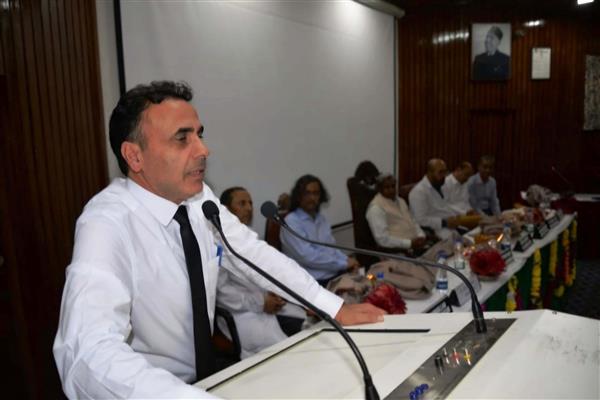Kashmir Magazine By : Kashmir Magazine | Srinagar, Publish Date: Tuesday, July 16, 2024 1:30:37 PM | Updated Date : Tuesday, July 16, 2024 1:30:37 PM

Excerpts from the interview.
Rizwan Rahim: We would like to know about you. You are an expert advisor, and an administrator. So, how do you see this whole Journey of yours?
Dr Ashraf: First of all, I would like to thank you for respecting our profession so much. You are right in saying that after Allah, whenever a person is in need, they think of a doctor or a hospital. Although I am a teacher and a doctor and have spent a lot of time in research, when I was given the responsibility to be an administrator, I thought a lot about it. Many people were telling me to apply, but I was hesitant. In the end, I realized that as an administrator, if I can build capacity in other departments, hospitals, or people associated with other health departments, and make it patient-friendly, then I have a better chance of achieving rewards. All the things that facilitate your life and career, and all the development, happen automatically.
Rizwan Rahim: We would like to know that this is a very big institution of J&K. All the patients across Kashmir are referred to this institution. You have such a big burden and 4,000 patients are treated here in the OPD every day. Do you think there is a lack of infra and man power?
Dr Ashraf: First of all, I would like to tell you that this institution is not only of J&K’s UT. Apart from AIIMS New Delhi and PGI Chandigarh, this institute can be ranked 5th. It plays a significant role not only for J&K but also for the whole country and the world. The trained doctors who leave from here go to foreign countries and establish new departments and institutions. This means that J&K is like a hub where we distribute knowledge. It is true that the local people have a right to be treated, so the reference institute that was initially established did not have a layout for emergency or routine OPDs. They did not consider it initially, but due to later developments, general OPDs and emergencies also started here. Last month, around 900 to 1,000 people came for emergency services every day. In comparison, there would be four hospitals in the West, in Europe and America, handling similar numbers. Our system is stretched, but our challenge is to expand and improve it with the support of our administration, staff, and doctors. We aim to double this institute in the next five years to manage the load for the next 10 to 20 years. We need a 50-year plan to ensure future stability.
Rizwan Rahim: You have talked about the emergency situation here. During the cold season, we had to face difficulties. Life-threatening diseases like cancer and kidney failure require continuous treatment. What steps are you going to take to address these challenges?
Dr Ashraf: The lack of practice is apparent because every month, doctors and staff retire, creating a challenge to fill these positions. We will address this with the support of the government, higher administration, and the public. Until we can recruit new staff, we need the existing staff to accommodate by overworking slightly. We also need external support, especially from the Kashmiri diaspora. I invite them to help us overcome these challenges. I am hopeful because of the warm welcome and support we receive. For instance, I received calls from the USA offering training for our doctors.
Rizwan Rahim: What steps will you take to ensure the recruitment and practice improvements?
Dr Ashraf: We have already sent 367 posts for paramedics to SSRB for recruitment. The government has decided to outsource the recruitment process, and SSRB will handle it. I will ensure they complete it promptly. We are also working on faculty rules and other guidelines, and I promise not to waste any time on my end. I will clear any bottlenecks that arise.
Rizwan Rahim: What can you say about the hospitals Primary and Secondary care health institutions?
Dr Ashraf: I have committed to strengthening and building capacity in peripheral hospitals. We will work in coordination with them so that minor ailments can be treated locally, and we can handle more complex cases. We will support them in every possible way, and I will discuss this with the Director of Health to ensure a collaborative effort.